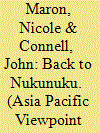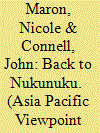|
|
|
Sort Order |
|
|
|
Items / Page
|
|
|
|
|
|
|
| Srl | Item |
| 1 |
ID:
083623


|
|
|
|
|
| Publication |
2008.
|
| Summary/Abstract |
Abstract: Return migration has escaped significant analysis in the Pacific island region. Both migration from and return migration to the Tongan village of Nukunuku are for multiple reasons, with migration centred on employment and education, and return centred on the social context of home and duty. Return is limited, with intentions not being matched with practice, and the village and national population not growing. However, return migrants acquire skills, capital and experience overseas, which can be transferred into a Tongan cultural context, although identities have changed during migration. Return migrants typically take up employment or acquire businesses on return, gain some social status from the outcome, and are neither failures nor retirees. Nonetheless, return engenders expectations and tensions exist between returnees and more established residents, although ultimately, return migrants contribute to household, local and national development, as part of an unfinished process.
|
|
|
|
|
|
|
|
|
|
|
|
|
|
|
|
| 2 |
ID:
084427


|
|
|
|
|
| Publication |
2008.
|
| Summary/Abstract |
Abstract: Return migration has escaped significant analysis in the Pacific island region. Both migration from and return migration to the Tongan village of Nukunuku are for multiple reasons, with migration centred on employment and education, and return centred on the social context of home and duty. Return is limited, with intentions not being matched with practice, and the village and national population not growing. However, return migrants acquire skills, capital and experience overseas, which can be transferred into a Tongan cultural context, although identities have changed during migration. Return migrants typically take up employment or acquire businesses on return, gain some social status from the outcome, and are neither failures nor retirees. Nonetheless, return engenders expectations and tensions exist between returnees and more established residents, although ultimately, return migrants contribute to household, local and national development, as part of an unfinished process.
|
|
|
|
|
|
|
|
|
|
|
|
|
|
|
|
|
|
|
|
|